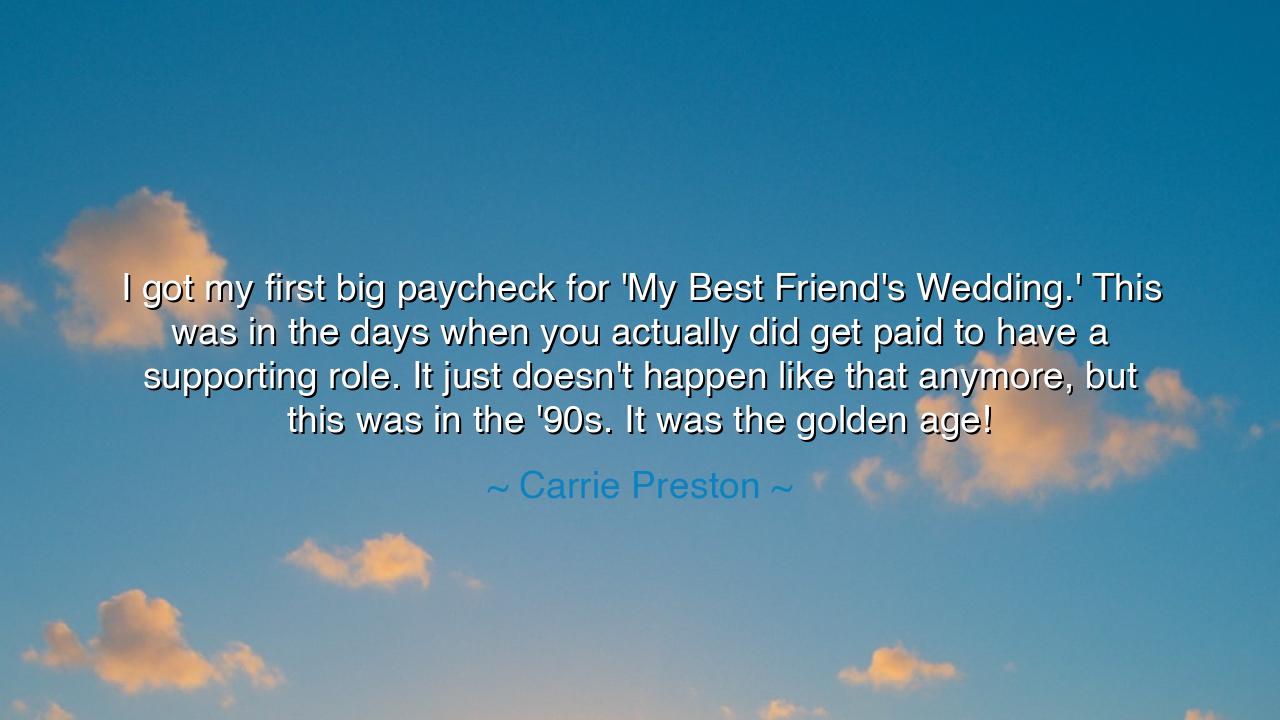
I got my first big paycheck for 'My Best Friend's Wedding.' This
I got my first big paycheck for 'My Best Friend's Wedding.' This was in the days when you actually did get paid to have a supporting role. It just doesn't happen like that anymore, but this was in the '90s. It was the golden age!






In the words of Carrie Preston—“I got my first big paycheck for My Best Friend’s Wedding. This was in the days when you actually did get paid to have a supporting role. It just doesn’t happen like that anymore, but this was in the ’90s. It was the golden age!”—there resounds both gratitude and lament. The paycheck she speaks of is not merely money, but the recognition of an artist’s worth, a token that affirmed her place in the craft. The ’90s, in her memory, shine as a golden age, when even those who stood in the shadows of the great stars could still share in the light.
The ancients often spoke of such golden ages, times when virtue or prosperity seemed more abundant than in their own days. Hesiod, the Greek poet, wrote of a Golden Age when men lived in ease, honored by the gods, and knew neither toil nor suffering. Preston’s words echo this timeless pattern: the looking back upon an earlier time when the balance between labor and reward seemed fairer, when the dignity of contribution was more readily acknowledged.
There is also in her story a reflection on the fate of supporting roles. In art, as in life, greatness does not rest solely upon the shoulders of those who lead. A play without its chorus, a kingdom without its citizens, a ship without its crew—all collapse. The ’90s, as Preston recalls, still honored those who held the stage from the side, whose presence made the story whole. To lose that honor, in later times, is not merely an economic shift but a diminishment of recognition for the many who sustain the few.
History, too, teaches us this truth. In the theaters of ancient Athens, even the minor actors were respected, for the polis understood that art was communal. But as empires waned, art grew less generous, and wealth clustered in fewer hands. Preston’s reflection is thus more than nostalgia; it is a warning that when a culture ceases to honor all who labor within it, the very vitality of its art begins to fade.
Thus, let this wisdom endure: honor the supporting role, whether in art or in life. For the golden ages are not made by stars alone, but by the harmony of all voices, great and small. And though times change, though wealth and recognition may diminish, the lesson remains eternal—that true greatness is shared, and no story is complete without those who stand quietly in its frame.






LTThuy linh Thai
It’s crazy to hear Carrie Preston talk about how different the industry was in the '90s. Back then, supporting roles were much better compensated, and it feels like things have shifted dramatically. With all the streaming services and changes in how content is consumed, do you think the value of supporting roles is underestimated now? What could the industry do to return some of that respect and pay for those important contributions?
CLDoan Cong Loc
Carrie Preston’s comment about the 'golden age' of acting pay in the '90s is fascinating, especially given how much the entertainment industry has changed since then. The fact that supporting roles were paid so well back then makes me wonder if actors now are undervalued for their contributions. Do you think the changing landscape of media and entertainment is part of why supporting roles are no longer as lucrative?
ADan danh
I find Carrie Preston's comment about the '90s being the 'golden age' of acting salaries really interesting. It makes me think about how the entertainment industry has evolved and how actors’ compensation has shifted. It’s also a bit nostalgic for a time when supporting roles were valued more financially. Why do you think there’s been such a drastic change in pay for supporting roles in Hollywood?
HTLe Huu Tri
Carrie Preston's reflection on her first big paycheck really brings into focus how much the entertainment industry has changed over the years. It’s crazy to think that in the '90s, supporting roles could earn actors substantial paychecks, whereas now, it's less common. It makes me wonder, what has led to this shift in the industry? Do you think actors are getting paid less for the same level of work today?